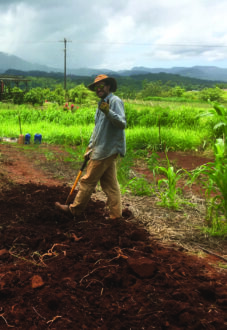Agricultural researchers often measure success in terms of higher yields or higher profits, but a new project in Hawaii is looking at a third dimension of success: Growers’ personal values.
“A lot of farmers make the transition to organic partially for commercial reasons, but it’s also a values-driven decision,” said Ben Wiseman, a third-year PhD student at the University of Hawaii. “So a measure of success could also be something that allows the farmer to farm more in accordance with their own values.”
Wiseman is exploring that third dimension of success with sweet potato farmers in Hawaii, who face fierce pest pressure from sweet potato weevils above ground and root knot nematodes below. He and the farmers will be testing nematode-suppressing cover crops and a weevil-suppressing biological pesticide. Both are less foolproof and more variable than synthetic chemical pesticides and may require more work on the growers’ part to be effective.
Is that extra effort worth it to a values-driven farmer, if the techniques prove successful?
“Farmers are doing a lot of experimenting on their own, especially in sustainable agriculture, because the techniques are very context dependent, or the efficacy is very context dependent, especially compared to these broad-spectrum chemical pest-management methods,” he said. “The application of these kinds of organic techniques is going to depend a lot on the farmer’s ability and interest to play around with it a little bit and integrate it into their own cropping system.”
Wiseman’s trials will begin on multiple farms with growers managing some plots as they traditionally have, and other plots using a combination of velvet bean planted as a cover crop and applications of a commercially available of entomopathogenic fungus with insecticidal properties. (A closely related fungus strain is native to Hawaii and could one day be available commercially, but isn’t being used in this research.)
An aspect of the project, which is funded by Western SARE, is getting the farmers to fine-tune an extension bulletin before it’s published. Wiseman has already done the basic research to show that velvet bean is effective at nematode suppression in trial plots. Now he wants to augment that research with farmer’s on-the-ground experiences.
“We want an extension publication to disseminate these outcomes to other Hawaiian producers, so let’s work with farmers to get their actual best practices, or explore some of the areas that are going to differ between farmers,” he explained. “That’s the practical part. The other interesting part is getting a better sense of how farmers are actually making decisions in the field so that their values and priorities can guide our future research.”
In case that all sounds too theoretical, the project will gather traditional measures, too.
“We’ll be looking at the actual soil nematode populations to measure the effect from the velvet bean and use sweet potato weevil traps to measure the effect of the fungus,” he said. “And we’ll also be looking at yield data, which is obviously very important for farmers.”
Because at the end of the season, growers want an abundant crop and a healthy profit – especially one produced in alignment with their personal values.
